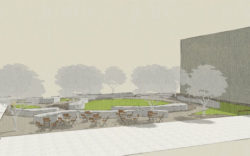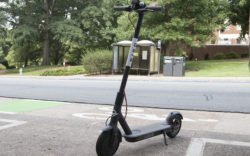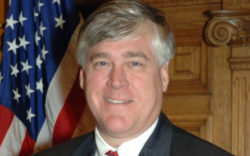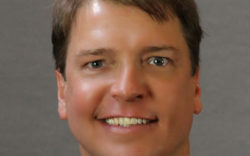ACC commissioners weren’t sure about moving the basketball courts, but otherwise they liked a plan for renovating Bishop Park first seen at last week’s work session. The popular park—originally opened as Athens Fairground Park in 1974 and later renamed for former mayor Julius Bishop—hasn’t seen extensive maintenance or upgrades in recent years. “Basically, this park has been loved to death,” acting Leisure Services Director Kent Kilpatrick told commissioners.
The plan could, eventually, completely renovate the park, but without making extensive changes to its present layout or uses. No fields, courts or facilities would be eliminated, but some would move around. The poolside building would be replaced with a 15,000-square-foot gymnastics facility; a splash pad, pickleball court and larger playground would be added; and the tennis courts and softball fields would be rehabbed. The basketball courts would move to the park’s northeast corner, near the present barbecue shed. The pickup soccer field along Sunset Drive would remain as is, with only a walking trail added around its perimeter. The parking lot would be improved and slightly expanded. Additional pedestrian entrances and fewer fences would “open up” the park, but the undeveloped “pastoral” fields would remain, as would the roofed tennis pavilion.
“Bishop Park is everything for everyone. It tries very hard to be that sort of park in a very small space,” Parks Administrator Mel Cochran Davis said. In 2014 surveys, she said, “People loved the things that are there; they just wanted them fixed.”
But a couple of commissioners wondered about moving the basketball courts. (The area is needed for stormwater absorption.) “There were some very strong advocates in public sessions that the courts stay as close as possible to where they are,” said Commissioner Jared Bailey.
Changes (and funding) are not imminent. Pending commission approval and public comments, a refined plan could be submitted for funding under SPLOST 2019.
Judge: Keep Mentally Ill Out of Jail and In Treatment
Data gathered in pursuit of a federal grant shows that people with mental health or addiction issues account for a large portion of local arrests, with 40 percent being clients or referrals of Advantage Behavioral Health Systems, which offers community treatment under contract with the state, during the study period. One-third of those had drug problems; the rest had other mental or emotional issues.
And those arrestees who were Advantage clients had more previous arrests—over a dozen on average, mostly probation violations and driving offenses—and stayed in jail three times as long as other arrestees, perhaps because they lacked the means to bond out, Superior Court Judge David Sweat told commissioners at last week’s work session. ACC Commissioner Jerry NeSmith called Sweat’s data “shocking and surprising.”
Already, Sweat’s Treatment and Accountability Court gives extra oversight and encouragement to probationers who have been referred for mental-health issues, and ACC’s Felony Drug Court provides similar support to offenders motivated by addictions.
If ACC does receive a $650,000 federal grant under the Justice and Mental Health Collaboration—and Sweat thinks the county has “a really strong chance”—it will hire a trained “co-responder” to accompany police when mental health issues appear to be a factor. “We want to be trying to divert people who have these significant issues before they’re in the jail,” Sweat said, both to save court and jail costs and to provide treatment where the jail can’t.
State Bill Could Triple Homeowners’ ‘Rain Tax’
Stormwater fees in ACC and elsewhere have helped pay for construction and maintenance of ditches and drains—and enforcement of good development practices—that deal with heavy rainwater runoff, but the non-traditional charges have not been popular with the property owners who pay them. “Taxpayers are tearing their hair [out],” Mayor Nancy Denson said as county Transportation and Public Works Director Drew Raessler explained why rates have gone up. The county’s efforts to make them fair so that owners of properties that produce more runoff water pay more in fees can be complex and confounding.
Better aerial analysis of properties has raised rates, Raessler said. Property owners are now charged for gravel driveways and parking areas and even decks and garden paths—not just roofs and paved areas—since gravel will compact and add to stormwater runoff, and decks may retard the vegetation growth that helps the ground absorb it. And most every property will have some runoff, he said, even if it’s not obvious.
Forty-four Georgia counties now charge stormwater fees, and citizens’ frustration has reached the legislature. State Sen. Frank Ginn (R-Danielsville) says his bill to bar the “rain tax” on “water-neutral” properties was developed in consultation with local officials, the Georgia Municipal Association and the Association County Commissioners of Georgia (and is “business friendly”). But those groups all seem to oppose it, saying “water-neutral” sites as defined in the bill still discharge stormwater.
Raessler told ACC commissioners the bill could end up tripling stormwater fees for homeowners to make up for lower fees for larger property owners. He proposed better explanation to the public about the fees, reconstituting an advisory committee, hiring a consultant or adjusting the rates or available credits. Stay tuned.
Like what you just read? Support Flagpole by making a donation today. Every dollar you give helps fund our ongoing mission to provide Athens with quality, independent journalism.










